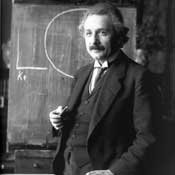Over the last two decades, emerging neuroscience findings have disproved a popular misconception that has led to prejudice and stereotyping over the years, as well as dangerous self-perpetuating violent cycles: that one is born smart or dumb. That is, in the whole "nature v. nurture" debate, nurture is winning in a landslide. Yes, genetics plays a role in intelligence, but a much smaller one than once thought. Researchers now know that much of intelligence—probably 80 percent or more—comes strictly from what happens starting all the way back in the cradle. (And the brain must be exercised into old age so it doesn't atrophy.) Not to mention, there is no difference in boys' and girls' competitive biology.
The good news is that most anyone can be a genius. The tougher news is that it is hard work. A flood of recent books have heralded the research that many hours of "deliberate practice"—10,000 seems to be the magic number—is what it takes to be great, often with a strong mentor and/or parent pushing you. And, yes, that applies to everyone from those little Suzuki violinists to Mozart (and his determined daddy) to baseball great Ted Williams to Albert Einstein to Olympic medalists to all the Asian kids whose parents push much more homework than do American counterparts.
The research proves it: Your kid (and you) can be great at something. The question is, can you focus on a skill or craft long enough, through many drafts and retries, to be great? Will you?
As Einstein said, "It's not that I'm so smart. It's just that I stay with problems longer."
Another hint: Turn off the TV.
Cigarette Smoke + Poor Nutrition = Several Generations of Lower Intelligence
Studies have shown that smoking (including second-hand smoke) and bad diets lead to several generations of less intelligent offspring.
A Place Called HOPE
Emotional intelligence expert Daniel Goleman says children need to have hope to be great and avoid troubled lives. "Students with high hope set themselves higher goals and know how to work hard to attain them." How can every adult help? Mentor a kid, and never, ever generalize about kids from certain schools or communities. You are destroying their hope and, thus, their potential. Looking at you, too, media.
How to instill hope:
1. Volunteer to mentor.
2. Help with community events.
3. Teach "self-efficacy" (a can-do attitude).
4. Challenge stereotypes.
5. Write letters to the editor of papers that bash teens.
6. Never call a group of kids a "gang."
7. Talk to young people; don't hide from them.
8. Don't mistake a nervous kid as a dangerous one.
9. Sound smart and talk "adult" with kids who don't expect it.
10. Show kids what a smart and successful adult looks like (as in: them some day).
In the FLOW, In the FLOW
Daniel Goleman urges parents to help kids learn to be "in the flow" or, as he calls it "self-forgetfulness." Most kids are in the flow at play, but many lose the skill as they approach work that requires sustained attention (especially with their phones buzzing). Find a task they're skilled at, and make sure they engage in it beyond their comfort zone. They must learn not to be fueled by worry; to do and think one thing at a time. They must learn absorption to be brilliant.
Highly Effective Kids
Ever get frustrated by young adults who can't manage their time, complete projects or take criticism well? Then, join the "The Leader In Me" campaign to teach children leadership skills from an early age, the brainchild of management guru Stephen R. Covey (of "The 7 Habits of Highly Effective People" fame).
His model school is A.B. Combs Elementary School in Raleigh, N.C., which was a low-performing school in 1999 in danger of being closed. Teacher and parent morale was low. The school's turnaround came after principal Muriel Summers approached Covey for help, and the school became a leadership magnet school where little kids (many non-white) develop goal lists for themselves and learn how to follow through with positive actions: a "work first, play later" character ethic, as Covey calls it. The strategy has turned the school around.
The kids learn these habits:
1. Be Proactive: You're in charge.
2. Begin with the end in mind: Have a plan.
3. Put first things first: Work first, then play.
4. Think win-win: Everyone can win.
5. Seek first to understand, then to be understood: Listen before you talk.
6. Synergize: Together is better.
7. Sharpen the saw: Balance feels best.
See http://http://www.theleaderinme.org for more information.
Books to help you raise a genius (or become one):
"The Genius In All of Us," David Shenk (Anchor Books, 2010, $15.95)
"Outliers: The Story of Success," Malcolm Gladwell (Little Brown, 2008, $27.99)
"Building Emotional Intelligence: Techniques to Cultivate Inner Strength in Children," Daniel Goleman (Sounds True Inc., 2008, $22.95) (and his other EI books)
"The Leader in Me: How Schools and Parents Around the World Are Inspiring Greatness, One Child at a Time," Stephen Covey (Free Press, 2008, $24.95)
"The Myth of Ability," John Mighton (Robinson Publishing, 2006, $14.99)



Comments
Use the comment form below to begin a discussion about this content.
comments powered by Disqus